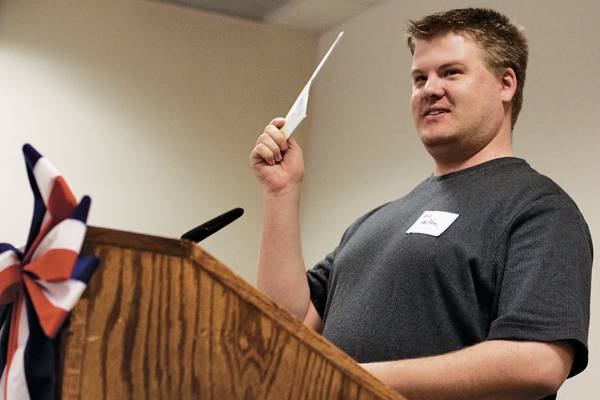Iowa Libertarians plan for future
April 24, 2010
During election years, political parties focus on campaign strategies and the best way for their candidates to win elections.
In the United States, candidates who are not Democrats or Republicans have a slim-to-none chance of getting elected to office.
That is why the Libertarian Party in Iowa has adopted a new strategy to get its ideas into government.
This strategy is not based around winning elections like would be excepted of other political campaigns.
It’s based on getting the major political parties to adopt Libertarian ideas into their agendas.
“We have had to give up the notion that we’re going to win elections,” said Eric Cooper, Libertarian candidate for governor of Iowa and an associate professor of psychology. “We can get everything we want without ever winning an election.”
Cooper’s strategy for getting Libertarian ideas instituted in the government is called the “10 percent strategy.”
This is a long term strategy that is aimed at accomplishing goals beyond this year’s elections.
The road to accomplishing this strategy is long and hard for the Libertarian Party.
The first step of the strategy is getting candidates on the ballot for this upcoming November elections in Iowa.
Cooper needs a petition signed by 1,500 people to get his name on the ballot as a candidate for governor.
After the petition is signed, Cooper needs 2 percent of Iowa’s vote for the Libertarians to be considered a political party in Iowa.
Other political organizations in Iowa have achieved political party status, but were unable to keep the status.
A candidate for governor or president must gain 2 percent of the state’s vote for his or her political organization to be considered a political party, according to the Iowa Secretary of State’s website.
The party’s candidate must continue to receive at least 2 percent of the vote in future elections of governor or president to keep the political party status.
If a candidate falls below the 2 percent mark, the organization is no longer considered political party in Iowa.
These organizations are called non-party political organizations. Currently, the only political parties in Iowa are Democrat and Republican.
If the Libertarians achieve political party status, all Libertarian candidates will be able to appear on the ballot during the 2012 election without the petition.
The next step in Cooper’s strategy is to go beyond the 2 percent vote in future elections. His goal is to receive 10 percent of Iowa’s vote for Libertarian candidates.
If the Libertarian party can consistently obtain 10 percent of the vote, then the major political parties will be forced to consider implementing Libertarian ideas into their campaigns to attract voters.
Cooper plans to get students involved to help him achieve these goals.
“I think young people are very Libertarian because I know they are concerned about the size of the government. So, it’s going to be high school and college students that I target during my campaign,” Cooper said.
One of these students is Jacob Saltzman, senior in psychology.
Saltzman decided to help with Cooper’s campaign after getting to know Cooper as a professor.
He is helping get the signatures on the petition.
Students are not only helping out with the campaign, but they are also running in elections themselves as Libertarian candidates.
Tyler Pauly, junior in physics, is running for the Iowa House of Representatives for the 46th District.
He is still putting school first, but looks forward to this new opportunity of getting to know the people of Ames and spreading the word about the Libertarian Party.
“I know a lot of people view Libertarians as whacks or just don’t know about them. I find it’s an easy way to get the message out to people that we aren’t crazy and to have an excuse to try and influence people,” Pauly said.
Cooper hopes to give the Libertarian Party more visibility in the 2010 election than it has had in the past.
For more information on Cooper’s campaign go to his website at www.coopersmallergovernment.com.







